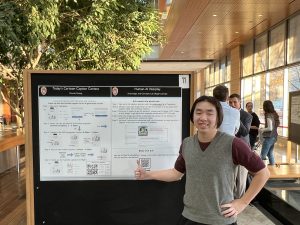On December 17, the first graduates of the Department of Psychology’s Data Science in Human Behavior program received their master’s degrees during UW-Madison’s Winter Commencement at the Kohl Center.

Two days earlier, in a more intimate space at the Wisconsin Institute for Discovery, those eight students presented their capstone projects, a key feature of the master’s program which pairs students with a community partner to apply data science tools and concepts to a specific problem with real-world practical implications.
For their capstone project, Sizhe Gao, Yanxue Ma, Lucas Modahl, and Yan Zhu partnered with Healthy Minds Innovations (HMI), a non-profit that provides tools for supporting healthy mental habits and cultivates the skills of well-being. The team worked together to create a central, standardized, documented database that encompasses all of HMI’s data in a single resource, properly cleaned, synchronized, and merged, with a pipeline for easily integrating/adding new data, possibly with integrated tools for different audiences (clients, researchers, etc.) to be able to access and visualize results.
A second group of graduate students (Alex Cheung, Lihao Hou, and Zhuolon Zhong) conducted research on humor data. With their development of a prototype system that allows users to interact with an AI “humor assistant,” Cheung, Hou, and Zhong enabled users to explore and visualize data from prior New Yorker caption contests, interact with the AI assistant to develop their own caption ideas, and even predict human ratings of caption ideas.

“Our aim was to create a tool that uses data science to help people develop their creativity, and allow scientists to explore/understand creativity, using the cartoon caption contest as an example domain,” the students wrote. “We hope these activities provide a useful foundation for understanding how science can be used to enhance abilities in this uniquely human domain, as well as some tools for studying this poorly understood aspect of human cognition.”
Finally, in partnership with Embark Behavioral Health, a nationwide network of outpatient centers and residential programs offering mental health treatment for preteens, teens, and young adults, graduate student Drew Beatty set out to analyze program outcomes and provide recommendations to clinicians and stakeholders. Over one semester, Beatty produced several analytical reports using Specialty Program clinical data, gave a new lens for visualizing and conceptualizing metrics related to client wellbeing, and developed a Clinical Index report which will be used for program assessment, with the overall goal of improving treatment quality; client, parent, and staff experiences; and on campus safety and staffing.
“These deliverables were received very favorably by all stakeholders,” wrote Embark’s leadership team, “and we are extremely grateful for Drew’s excellent dedication to her projects.”
Congratulations to all our master’s program graduates!